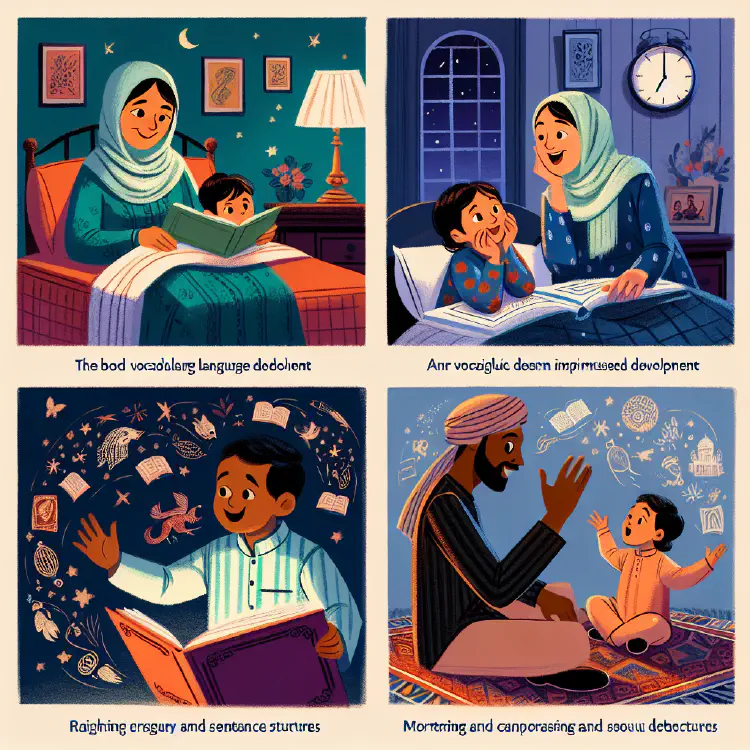The Benefits of Storytelling for Early Language Development
Storytelling enhances children's language skills, imagination, and emotional intelligence while fostering parent-child bonding and improving listening abilities.
- 4 min read

As parents, we all want to give our children the best possible start in life, especially when it comes to their language development. One of the most effective and enjoyable ways to support your child’s linguistic growth is through storytelling. Whether it’s through bedtime stories, short tales throughout the day, or even improvised narratives, storytelling offers a wealth of benefits for young minds. In this blog post, we’ll explore the numerous advantages of storytelling for early language development and provide practical tips for incorporating this valuable practice into your daily routine.
The Power of Bedtime Stories
Bedtime stories have been a cherished tradition for generations, and for good reason. These nightly tales serve as more than just a way to wind down before sleep; they play a crucial role in fostering language skills, imagination, and emotional connections. When you engage in bedtime stories with your child, you’re not only creating lasting memories but also laying the foundation for their future academic success.
For preschoolers and toddlers, bedtime stories offer a consistent and comforting routine that can help ease the transition to sleep. As you snuggle up with your little one and open a book or begin a familiar tale, you’re creating a safe and nurturing environment that encourages learning and bonding. These precious moments of connection can have far-reaching effects on your child’s emotional and cognitive development.
Language Acquisition Through Storytelling
One of the primary benefits of storytelling for early language development is its ability to expose children to a rich vocabulary and complex sentence structures. When you read bedtime stories or share oral narratives, you’re introducing your child to words and phrases they might not encounter in everyday conversation. This exposure helps expand their vocabulary and enhances their understanding of language patterns.
For toddlers and preschoolers, hearing stories regularly can accelerate their language acquisition process. As they listen to tales filled with descriptive language, dialogue, and varied sentence structures, they begin to internalize these linguistic elements. Over time, this exposure helps them develop a more sophisticated grasp of language, which can translate into improved communication skills and reading comprehension later in life.
Enhancing Listening Skills and Attention Span
In our fast-paced, technology-driven world, it’s becoming increasingly challenging for children to develop strong listening skills and maintain focus for extended periods. Storytelling, particularly through bedtime stories and short stories, can help combat this trend by encouraging active listening and engagement.
When you share a story with your child, whether it’s a classic fairy tale or a five-minute bedtime story, you’re inviting them to focus their attention on the narrative. This practice helps strengthen their ability to concentrate and follow a sequence of events. As children become more accustomed to listening to stories, they often develop longer attention spans, which can benefit them in various aspects of their lives, including academic performance and social interactions.
Fostering Imagination and Creativity
One of the most magical aspects of storytelling is its ability to transport listeners to new worlds and spark their imagination. When you share bedtime stories for kids or engage in creative storytelling, you’re opening up a universe of possibilities for your child’s mind to explore. This imaginative exercise is not only enjoyable but also crucial for cognitive development.
As children listen to stories, they create mental images of the characters, settings, and events described. This process of visualization helps develop their creative thinking skills and encourages them to think beyond their immediate experiences. Over time, this enhanced creativity can translate into improved problem-solving abilities and innovative thinking in various areas of their lives.
Emotional Intelligence and Empathy
Stories have a unique power to evoke emotions and help children understand and process complex feelings. Through characters’ experiences and conflicts in bedtime stories for preschoolers or toddlers, children can learn about different emotions and how to navigate challenging situations. This exposure to various emotional scenarios helps develop their emotional intelligence and empathy.
As you read or tell stories to your child, take the time to discuss the characters’ feelings and motivations. Encourage your little one to put themselves in the characters’ shoes and imagine how they might feel in similar situations. This practice not only enhances their emotional vocabulary but also helps them develop a deeper understanding of others’ perspectives – a crucial skill for building strong relationships throughout life.
Building a Strong Parent-Child Bond
The act of sharing stories, particularly at bedtime, creates a special bond between parent and child. These intimate moments of connection provide an opportunity for physical closeness, emotional sharing, and undivided attention. As you cuddle up with your little one for goodnight stories, you’re creating a safe space for them to express their thoughts, ask questions
